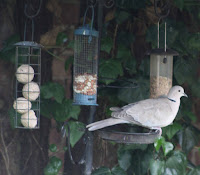Are Garden Feeders Harming Bird Populations?
ZSL and BTO published their joint report on the health of
our garden birds this week. Could it be
that we are inadvertently harming our garden visitors? They had some interesting
findings about two diseases in particular.
Finch trichomonosis
is a protozoal infection which causes laboured breathing, difficulty swallowing
and drooling. Infected birds are thin
and emaciated, and sometimes have matted, wet looking plumage around the face
and beak. It mostly affects greenfinch
and chaffinch but any flock forming seed feeder is susceptible. It is believed
that trichomonosis is responsible for a 60% reduction in the breeding
greenfinch population since 2006. It is
spread through food or water that is contaminated by an infected bird, though
the protozoa can not survive for long outside the host.
Passerine
Salmonellosis doesn’t show any characteristic symptoms, but birds are
lethargic with fluffed plumage, and emaciated.
Like trichomonosis, it affects gregarious seed eaters especially house
sparrows and greenfinches. It is
transmitted through contaminated water or food and can survive in the
environment for weeks. If you suspect an
outbreak of disease in your garden bird population you should report your
observations to gardenwildlifehealth.org.
 |
| Hygiene is crucial! |
Our feathered friends still need our help, so what can we
do? Anywhere where there is a large
gathering of birds meeting regularly will increase the danger of infection.
Most diseases whether bird or animal is spread by droppings so feeder and table
hygiene is crucial. Rats are attracted
to left overs, so only put enough in the feeders to last a day or two and
refill. Mouldy food is a breeding ground
for parasites and bacteria so feeders and tables must be washed and disinfected
regularly, and tables should be re-sited monthly to prevent droppings accumulating
underneath. Water dishes should be
washed and dried thoroughly, and water should be fresh each day. Always wash your hands after you’ve touched
your bird feeders and wear gloves when you are washing them!


Comments
Post a Comment